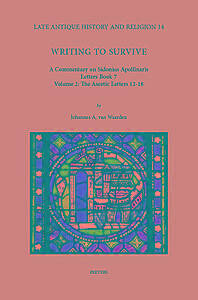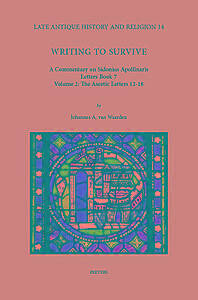
- Afhalen na 1 uur in een winkel met voorraad
- Gratis thuislevering in België vanaf € 30
- Ruim aanbod met 7 miljoen producten
- Afhalen na 1 uur in een winkel met voorraad
- Gratis thuislevering in België vanaf € 30
- Ruim aanbod met 7 miljoen producten
Zoeken
Writing to Survive. a Commentary on Sidonius Apollinaris, Letters Book 7. Volume 2
The Ascetic Letters 12-18
J.A. van Waarden
€ 85,00
+ 170 punten
Omschrijving
Asceticism, and the antidote it offers to contemporary secular disappointments in fifth-century Gaul, is the central theme in the second part of Book 7 of Sidonius Apollinaris' correspondence. Addressing a state of ferment in which the closely-knit Gallo-Roman elite is shifting its moral and religious parameters along with its political certainties, these letters only reveal their full significance - this commentary claims - when read as ascetic documents mirroring the mentality of the monks of Lerins. This second volume of Writing to Survive follows the first (LAHR 2) in scope and method, providing detailed philological underpinning as well as a wealth of thematic research. Together, these two volumes constitute an important contribution towards the comprehensive range of commentaries on Sidonius' work planned by the 'Sidonius Apollinaris for the Twenty-First Century' project for publication in the LAHR series. Like its companion volume, this work will be of interest to classicists and medievalists, to literary scholars and church historians, to those concerned with philological and historical intricacies and those interested in the broader development of literature and mentalities in Late Antiquity.
Specificaties
Betrokkenen
- Auteur(s):
- Uitgeverij:
Inhoud
- Aantal bladzijden:
- 340
- Taal:
- Engels
- Reeks:
- Reeksnummer:
- nr. 14
Eigenschappen
- Productcode (EAN):
- 9789042933538
- Verschijningsdatum:
- 31/12/2016
- Uitvoering:
- Hardcover
- Formaat:
- Genaaid
- Afmetingen:
- 168 mm x 246 mm
- Gewicht:
- 757 g

Alleen bij Standaard Boekhandel
+ 170 punten op je klantenkaart van Standaard Boekhandel
Beoordelingen
We publiceren alleen reviews die voldoen aan de voorwaarden voor reviews. Bekijk onze voorwaarden voor reviews.











